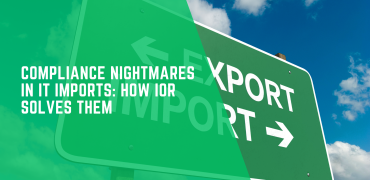In the fast-paced world of technology, telecom companies rely on seamless global logistics to expand their networks and deliver cutting-edge services. One of the most critical components of this expansion is the effective use of Importer of Record (IOR) services, which streamline the complexities of international trade compliance.
This case study explores how IOR services played a pivotal role in enabling a telecom company’s expansion into new markets, showcasing the challenges faced, solutions implemented, and key takeaways for businesses navigating similar journeys.
The Telecom Company: A Vision for Growth
The client, a multinational telecom company, was embarking on a bold expansion plan to establish its presence in multiple countries across Asia and Africa. Their objective was to deploy state-of-the-art infrastructure, including telecom towers, data centers, and 5G-enabled devices.
Challenges Identified
Expanding into new markets presented the following logistical and regulatory hurdles:
- Complex Customs Regulations: Each target market had its own import/export regulations, often requiring extensive documentation and certifications.
- High Import Taxes and Duties: The company needed to optimize costs while ensuring compliance with local tax laws.
- Time-Sensitive Deployments: Telecom infrastructure had to be installed and operational within tight timelines to meet market demands.
- Lack of Local Expertise: Navigating unfamiliar regulatory landscapes posed a significant challenge.
The telecom company recognized that a robust IOR solution was essential for overcoming these obstacles.
What Are IOR Services?
Importer of Record (IOR) services simplify the process of importing goods into a country by acting as the official importer on behalf of the client. IOR providers handle:
- Customs compliance and documentation
- Payment of duties, taxes, and fees
- Adherence to local regulations and certifications
IOR services ensure businesses can focus on their core operations while maintaining compliance with international trade laws.
IOR Service Partner: A Strategic Collaboration
The telecom company partnered with a global IOR service provider known for its expertise in handling technology and telecommunications equipment. The provider brought extensive experience, a network of local agents, and advanced digital tools to the table.
Goals of the Partnership
- Ensure full compliance with customs and trade regulations.
- Minimize delays and disruptions in the supply chain.
- Optimize import-related costs.
- Provide end-to-end visibility and tracking of shipments.
Implementation: A Step-by-Step Approach
The IOR service provider worked closely with the telecom company to develop a customized strategy.
1. Pre-Import Assessment
The first step involved a detailed analysis of the company’s equipment, target markets, and regulatory requirements. Key activities included:
- Classification of Goods: Assigning accurate Harmonized System (HS) codes to ensure proper duty assessment.
- Regulatory Review: Identifying certification requirements for telecom equipment in each country, such as safety standards and frequency approvals.
- Cost Estimation: Calculating import taxes, duties, and service fees for budgeting purposes.
2. Documentation Preparation
IOR services prepared all necessary documents, including:
- Commercial invoices
- Packing lists
- Certificates of origin
- Import permits and licenses
By centralizing documentation, the provider ensured error-free submissions to customs authorities.
3. Customs Clearance and Importation
The IOR provider acted as the official importer in each country, handling:
- Customs clearance processes
- Payment of applicable duties and taxes
- Compliance checks to avoid penalties or delays
Their local agents facilitated smooth interactions with customs officials, leveraging their in-depth knowledge of regulations.
4. End-to-End Shipment Management
To meet the telecom company’s tight deadlines, the IOR provider employed a multi-modal logistics strategy, combining air and sea freight. Real-time tracking tools provided full visibility of shipments, allowing the telecom company to monitor progress and coordinate installations.
Key Results and Outcomes
The partnership between the telecom company and the IOR service provider delivered measurable results:
1. Regulatory Compliance and Risk Mitigation
- All shipments complied with local laws, avoiding fines and penalties.
- Equipment certifications were obtained without delays, enabling seamless installations.
2. Cost Savings
- Strategic classification of goods minimized import duties.
- Efficient customs clearance reduced storage fees and demurrage costs.
3. Faster Time-to-Market
- The telecom company met its aggressive deployment schedules, gaining a competitive edge in new markets.
4. Streamlined Operations
- The IOR provider’s expertise eliminated the need for the telecom company to invest in in-house compliance teams or local offices.
Challenges Faced During Implementation
Despite the success, the project was not without challenges:
A. Evolving Regulations
Some countries revised their telecom equipment import policies mid-project, requiring quick adjustments.
B. Geopolitical Risks
Political instability in certain regions caused temporary disruptions, necessitating alternative logistics routes.
C. Equipment Sensitivity
High-value, fragile equipment required specialized handling and packaging to prevent damage during transit.
The IOR provider demonstrated agility in overcoming these challenges, ensuring the project stayed on track.
Lessons Learned and Best Practices
1. Choose the Right IOR Partner
Select a provider with a proven track record in your industry and target markets. Their local expertise can make a significant difference in navigating complex regulations.
2. Prioritize Pre-Import Planning
Thoroughly assess regulatory requirements and costs before initiating shipments to avoid unexpected delays or expenses.
3. Embrace Technology
Invest in digital tools for real-time shipment tracking, documentation management, and risk assessment.
4. Foster Collaboration
Maintain open communication between your logistics teams, IOR provider, and local agents to address challenges proactively.
Conclusion: IOR Services as a Catalyst for Global Expansion
For the telecom company, partnering with an IOR service provider was a game-changer, enabling them to overcome logistical and regulatory hurdles during their expansion. By ensuring compliance, optimizing costs, and delivering on tight deadlines, IOR services allowed the company to focus on its core mission—connecting people through advanced technology.
As globalization continues to expand opportunities for businesses, the role of IOR services in simplifying international trade will only grow in importance. For companies eyeing cross-border growth, leveraging the expertise of a trusted IOR provider is not just an option—it’s a strategic necessity.




